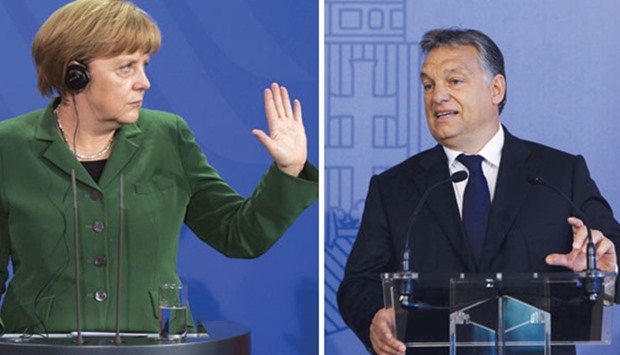Hungary has announced a referendum on taking in migrants under a troubled EU quota plan, a scheme that right-wing prime minister and fierce Brussels critic Viktor Orban has vehemently rejected.
Last year Orban voted against sharing 160,000 migrants around the 28-nation European Union via mandatory quotas, saying that the bloc has no right to “redraw Europe’s cultural and religious identity”.
The scheme, meant to ease pressure on Greece and Italy, the main entry points into the bloc for migrants fleeing the Syrian civil war, was approved by a majority of EU member states.
Hungary has joined Slovakia in filing a legal challenge against the plan, and Orban had announced participation would be put to a public vote.
Yesterday the presidency set the date as October 2.
Voters will be asked: “Do you want the EU to prescribe the mandatory relocation of non-Hungarian citizens to Hungary without the approval of the Hungarian parliament?”
Budapest says that the plan – which has been extremely slow to get going – violates its national sovereignty and that “terrorists” might enter the country disguised as migrants.
As of July 1, fewer than 2,800 people – 789 from Italy and 1,994 from Greece – have been relocated, according to EU data.
Hungary has made zero places available but is meant to take in 1,294 people.
In Berlin, German Chancellor Angela Merkel said that she expected the referendum to change nothing.
“The question has been phrased in such a way that it asks for an answer to the already prevailing government policy – the opinion of the Hungarian prime minister on refugees is well known,” Merkel said.
Orban has long had a testy relationship with Brussels with critics saying that his shake-up of Hungarian institutions from 2010 – since mirrored in fellow EU member Poland – has undermined democracy.
But his stance during Europe’s migrant crisis, which has seen more than a million people undertake a perilous journey to the continent, has caused particular ire.
Around 400,000 migrants and refugees passed through Hungary in 2015 before the government sealed off the southern borders with razor wire and fences in the autumn.
The authorities also brought in tough new laws punishing illegal entry and vandalism of the fences.
Last year the government erected billboards warning foreigners not to take jobs from Hungarians.
Yesterday new legislation took effect, returning any migrant found within 8km (5.0 miles) to “transit zones” located in no-man’s land between Hungary and Serbia.
Rupert Colville, spokesman for the UN High Commissioner for Human Rights, said yesterday that this may result in police “forcibly expelling (migrants) without any form of legal procedure”.
“With hundreds of people already waiting in the strip of land between the Serbian passport control and the Hungarian barbed wire fence, we also fear that this measure will only worsen the existing desperate and inhuman conditions at the border,” he said in Geneva.
Orban said after Britain’s June 23 referendum decision to leave the EU – he had urged Britons to remain in advertisements taken out in British newspapers – that a big factor was immigration.
“The British wanted to find a way to resist this exodus of modern times,” Orban said.
EU leaders “have done nothing to stop the wave of migration ... which has led to less security, an increase in danger and aggression”.
Hungary’s opposition Socialist Party accused Orban yesterday of wanting to pull Hungary out of the EU “using the wildest lies”.
The government is planning a billboard, television and Internet campaign urging voters to “send a message to Brussels that they will understand!”
In order for the plebiscite result to be valid, turnout needs to be above 50%, and previous referendums have struggled to reach this level.

Merkel: expected the referendum to change nothing. Orban: has said that the bloc has no right to ‘redraw Europe’s cultural and religious identity’.
